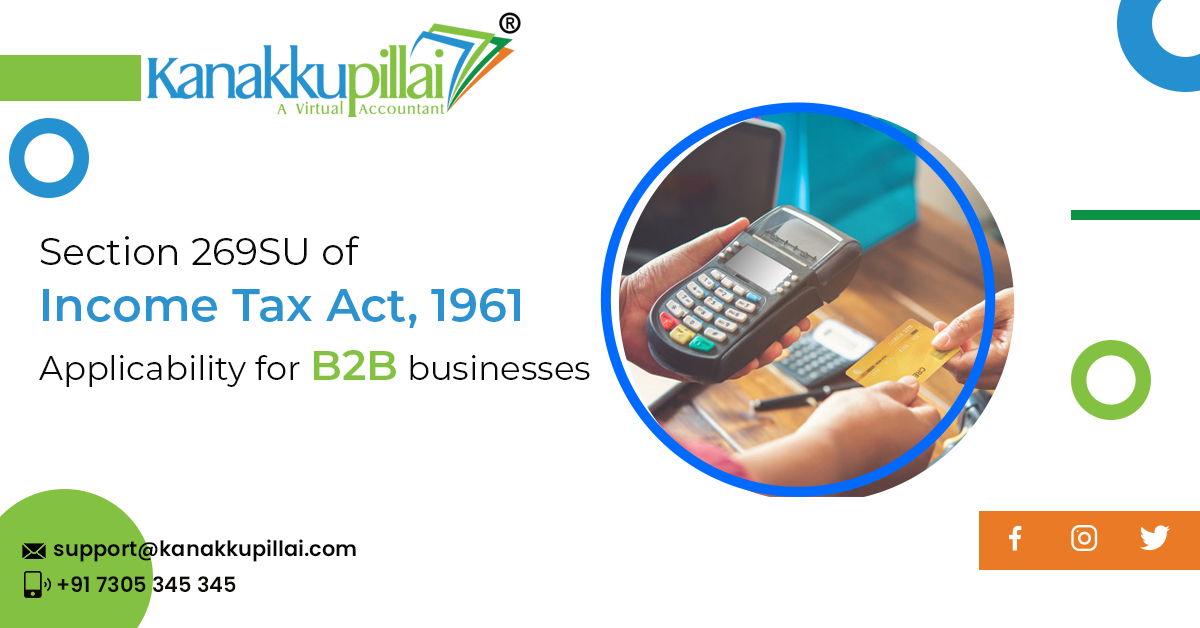Last Updated on July 23, 2025
In recent years, the Government of India has taken remarkable steps to promote a cashless economy to improve and enhance the level of transparency and accountability in financial transactions. As part of this initiative, Section 269SU was introduced in the Income Tax Act, 1961, through the Finance Act, 2019. This section is aimed at ensuring that specified businesses provide digital payment facilities to their customers.
In this blog, we will understand what Section 269SU is, its purpose, applicability, compliance requirements, penalties for non-compliance, and its impact on businesses.
What is Section 269SU?
Section 269SU of the Income Tax Act, 1961, mandates that every person carrying on business and having a total sale, turnover, or gross receipts exceeding ₹50 crore in the immediately preceding previous year must provide facilities for accepting payments through prescribed electronic modes.
This means that such businesses must offer their customers the option to make payments through digital mode by using specific methods as notified by the government.
Objective of Section 269SU
The primary objectives of Section 269SU are:-
- To promote and elevate digital transactions and reduce dependency on cash.
- To bring more transparency and accountability to business transactions.
- To curb tax evasion by encouraging traceable payment methods.
- To align with the “Digital India” movement of the government.
By mandating certain businesses to provide digital payment options, the government intends to create a more robust and formal economy…!
Applicability of Section 269SU
Section 269SU is applicable to businesses that meet the following conditions:
- The total sales, turnover, or the gross receipts of the business during the immediately preceding financial year exceed ₹50 crores.
This provision applies to all types of businesses—whether they are companies, partnership firms, LLPs, or proprietorships—provided they meet the turnover threshold.
Prescribed Electronic Modes for Digital Payments
The Central Board of Direct Taxes (CBDT) has notified the following three digital payment modes that must be compulsorily made available by businesses falling under Section 269SU:
- Debit Card powered by RuPay
- Unified Payments Interface (UPI) (BHIM-UPI)
- Unified Payments Interface Quick Response Code (BHIM-UPI QR Code)
These modes are chosen as they are cost-effective and widely used in India. Businesses are not restricted from offering other payment modes like wallets, credit cards, or net banking, but the above three are mandatory under this provision.
Penalty for Non-Compliance
Section 271DB of the Income Tax Act provides for the penalty in case of non-compliance with Section 269SU. If a business does not provide the specified electronic payment modes, a penalty of ₹5,000 per day during the period of default can be levied by the Assessing Officer.
However, before imposing the penalty, the Assessing Officer may provide an opportunity to the business to present a valid reason for non-compliance.
Important Points to Note
- The provision applies to the previous year and not the current year. For example, if a business had turnover exceeding ₹50 crores in FY 2023–24, it must comply with Section 269SU in FY 2024–25.
- The payment infrastructure for the three specified digital modes should be functional and accessible to customers at all business locations.
- The business should not levy any additional charge or surcharge on customers for using these modes.
Benefits of Compliance
Complying with Section 269SU not only helps avoid penalties but also offers various advantages:-
- Enhances the level of customer convenience.
- Builds customer trust through transparent payment options.
- Minimise the risks related to cash handling.
- Aligns the business with the modern payment practices.
- It helps and supports in better financial tracking and accounting…!
Conclusion
Section 269SU is an essential step towards digitising the structure of the Indian economy. Businesses that meet the prescribed turnover criteria must ensure the timely and proper compliance with this provision to avoid penalties and other legal complications. Offering the various digital payment options is no longer a luxury but has become a necessity in today’s fast-paced and high-technology-driven market.
For business owners, complying with Section 269SU is not just about meeting a legal obligation; it is also an opportunity to modernise their operations and enhance customer satisfaction. By adopting digital payment systems, businesses can contribute to a more transparent, efficient, and accountable financial ecosystem.
Related Services





